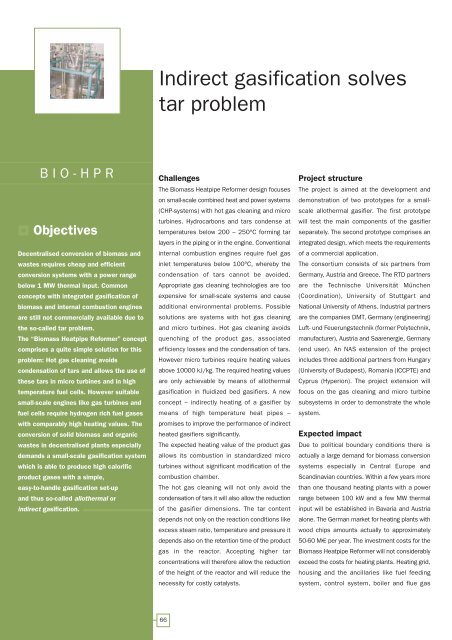European Bio-Energy Projects
European Bio-Energy Projects
European Bio-Energy Projects
You also want an ePaper? Increase the reach of your titles
YUMPU automatically turns print PDFs into web optimized ePapers that Google loves.
BIO-HPR<br />
Objectives<br />
Decentralised conversion of biomass and<br />
wastes requires cheap and efficient<br />
conversion systems with a power range<br />
below 1 MW thermal input. Common<br />
concepts with integrated gasification of<br />
biomass and internal combustion engines<br />
are still not commercially available due to<br />
the so-called tar problem.<br />
The “<strong>Bio</strong>mass Heatpipe Reformer” concept<br />
comprises a quite simple solution for this<br />
problem: Hot gas cleaning avoids<br />
condensation of tars and allows the use of<br />
these tars in micro turbines and in high<br />
temperature fuel cells. However suitable<br />
small-scale engines like gas turbines and<br />
fuel cells require hydrogen rich fuel gases<br />
with comparably high heating values. The<br />
conversion of solid biomass and organic<br />
wastes in decentralised plants especially<br />
demands a small-scale gasification system<br />
which is able to produce high calorific<br />
product gases with a simple,<br />
easy-to-handle gasification set-up<br />
and thus so-called allothermal or<br />
indirect gasification.<br />
Indirect gasification solves<br />
tar problem<br />
Challenges<br />
The <strong>Bio</strong>mass Heatpipe Reformer design focuses<br />
on small-scale combined heat and power systems<br />
(CHP-systems) with hot gas cleaning and micro<br />
turbines. Hydrocarbons and tars condense at<br />
temperatures below 200 – 250°C forming tar<br />
layers in the piping or in the engine. Conventional<br />
internal combustion engines require fuel gas<br />
inlet temperatures below 100°C, whereby the<br />
condensation of tars cannot be avoided.<br />
Appropriate gas cleaning technologies are too<br />
expensive for small-scale systems and cause<br />
additional environmental problems. Possible<br />
solutions are systems with hot gas cleaning<br />
and micro turbines. Hot gas cleaning avoids<br />
quenching of the product gas, associated<br />
efficiency losses and the condensation of tars.<br />
However micro turbines require heating values<br />
above 10000 kJ/kg. The required heating values<br />
are only achievable by means of allothermal<br />
gasification in fluidized bed gasifiers. A new<br />
concept – indirectly heating of a gasifier by<br />
means of high temperature heat pipes –<br />
promises to improve the performance of indirect<br />
heated gasifiers significantly.<br />
The expected heating value of the product gas<br />
allows its combustion in standardized micro<br />
turbines without significant modification of the<br />
combustion chamber.<br />
The hot gas cleaning will not only avoid the<br />
condensation of tars it will also allow the reduction<br />
of the gasifier dimensions. The tar content<br />
depends not only on the reaction conditions like<br />
excess steam ratio, temperature and pressure it<br />
depends also on the retention time of the product<br />
gas in the reactor. Accepting higher tar<br />
concentrations will therefore allow the reduction<br />
of the height of the reactor and will reduce the<br />
necessity for costly catalysts.<br />
66<br />
Project structure<br />
The project is aimed at the development and<br />
demonstration of two prototypes for a smallscale<br />
allothermal gasifier. The first prototype<br />
will test the main components of the gasifier<br />
separately. The second prototype comprises an<br />
integrated design, which meets the requirements<br />
of a commercial application.<br />
The consortium consists of six partners from<br />
Germany, Austria and Greece. The RTD partners<br />
are the Technische Universität München<br />
(Coordination), University of Stuttgart and<br />
National University of Athens. Industrial partners<br />
are the companies DMT, Germany (engineering)<br />
Luft- und Feuerungstechnik (former Polytechnik,<br />
manufacturer), Austria and Saarenergie, Germany<br />
(end user). An NAS extension of the project<br />
includes three additional partners from Hungary<br />
(University of Budapest), Romania (ICCPTE) and<br />
Cyprus (Hyperion). The project extension will<br />
focus on the gas cleaning and micro turbine<br />
subsystems in order to demonstrate the whole<br />
system.<br />
Expected impact<br />
Due to political boundary conditions there is<br />
actually a large demand for biomass conversion<br />
systems especially in Central Europe and<br />
Scandinavian countries. Within a few years more<br />
than one thousand heating plants with a power<br />
range between 100 kW and a few MW thermal<br />
input will be established in Bavaria and Austria<br />
alone. The German market for heating plants with<br />
wood chips amounts actually to approximately<br />
50-60 M€ per year. The investment costs for the<br />
<strong>Bio</strong>mass Heatpipe Reformer will not considerably<br />
exceed the costs for heating plants. Heating grid,<br />
housing and the ancillaries like fuel feeding<br />
system, control system, boiler and flue gas

















